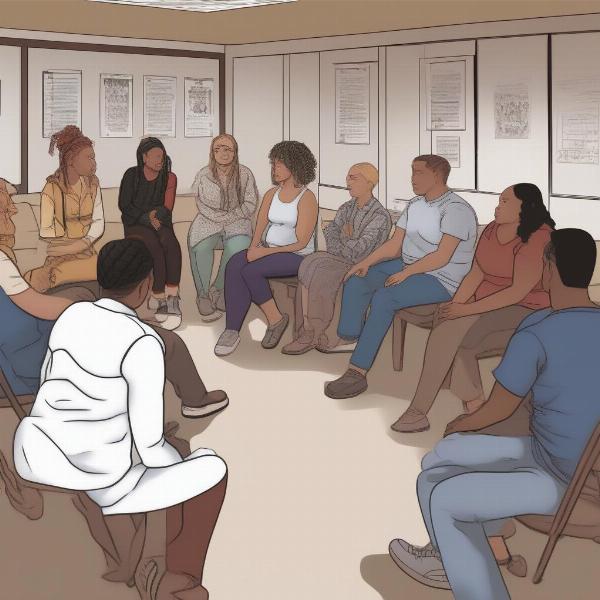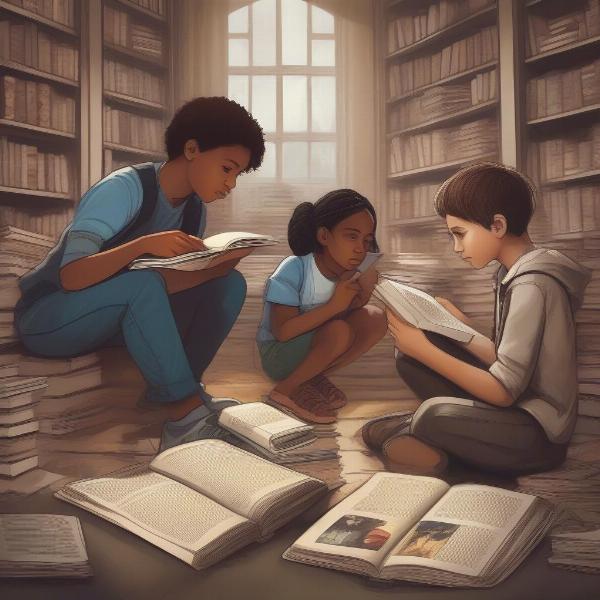The question “Why The Hunger Games Was Banned” often pops up in online discussions. The truth is more nuanced than a simple ban. While the series hasn’t been outright banned nationally anywhere, it has faced challenges, removals, and restrictions in specific locations. Let’s explore the reasons behind these attempts to censor The Hunger Games and understand the complexities surrounding this popular dystopian series.
Controversial Themes and the Push for Censorship
The Hunger Games trilogy, penned by Suzanne Collins, paints a grim picture of Panem, a post-apocalyptic nation where children are forced to fight to the death in a televised spectacle. This core premise understandably raises concerns, making it a target for censorship attempts. The series has been challenged for its depiction of violence, particularly against children, as well as for its political and social themes. Many challenges stem from parents and community members worried about the impact of such content on young, impressionable readers.
- Violence and its Impact: The graphic descriptions of violence, while central to the narrative, can be disturbing. Critics argue that such exposure desensitizes young readers to violence or even inspires aggressive behavior. This concern is a recurring theme in challenges to the series.
- Political and Social Commentary: The series doesn’t shy away from exploring complex themes like oppression, rebellion, and social inequality. These themes, while prompting important discussions, can be perceived as subversive or inappropriate for certain age groups. In some cases, challenges have arisen from those who believe the series promotes anti-government sentiments or encourages unrest.
A Closer Look at Censorship Attempts: Where and Why
While “banned” might be an overstatement in most cases, The Hunger Games has indeed faced challenges and removals from libraries and schools. These attempts often originate from concerned parents or community groups, citing the previously mentioned concerns about violence and political themes.
- School Library Removals: In some schools, the series has been removed from library shelves or restricted to certain age groups. These decisions are typically made at the local level, often in response to parental complaints or concerns raised by school boards.
- Challenges in Educational Settings: The inclusion of The Hunger Games in school curricula has also been debated. Some educators embrace the series as a tool for exploring complex themes and engaging students in critical thinking, while others worry about its suitability for younger learners.
 Hunger Games Book Ban Controversy: Exploring the Reasons and Debates
Hunger Games Book Ban Controversy: Exploring the Reasons and Debates
The Power of Dystopian Fiction: Examining the Underlying Message
The Hunger Games, like other dystopian novels, holds a mirror to society, reflecting and exaggerating its flaws. This can be uncomfortable, but it’s also what makes dystopian fiction so compelling and thought-provoking. The series encourages readers to question authority, examine social injustices, and consider the consequences of unchecked power.
- Promoting Critical Thinking: By presenting a bleak future, The Hunger Games prompts readers to think critically about the present. It encourages discussion about the dangers of totalitarianism, the importance of individual agency, and the responsibility we have to create a more just society.
- Empowering Young Readers: Despite the dark themes, the series also offers a message of hope and resilience. Katniss Everdeen, the protagonist, becomes a symbol of resistance and inspires others to fight for change. This empowering message resonates with young readers, encouraging them to find their voice and stand up for what they believe in.
The Importance of Context and Interpretation
It’s crucial to remember that interpretations of literature are subjective and influenced by individual experiences and cultural contexts. What might be considered inappropriate in one context could be viewed as valuable and thought-provoking in another. Open discussions about challenging themes are essential, and outright banning books often stifles these important conversations.
- Parental Guidance and Education: Rather than banning books, it’s more effective to encourage parents and educators to engage in open dialogues with young readers about the content they’re consuming. This approach fosters critical thinking and helps young people develop the skills to analyze and interpret complex themes.
- Protecting Intellectual Freedom: Banning books sets a dangerous precedent, limiting access to information and restricting intellectual freedom. It’s essential to protect the right to read and engage with diverse perspectives, even those that may be challenging or controversial.
 Hunger Games Censorship Debate: Parents and Educators Discussing the Series
Hunger Games Censorship Debate: Parents and Educators Discussing the Series
Beyond the Ban: The Hunger Games’ Lasting Impact
Despite the censorship attempts, The Hunger Games has undeniably made a significant cultural impact. It has sparked countless discussions, inspired creative projects, and even influenced political discourse. The series continues to resonate with readers and viewers worldwide, demonstrating the enduring power of storytelling to explore complex and challenging themes.
- A Catalyst for Conversation: The series has become a catalyst for conversations about social justice, political power, and the role of media in shaping public opinion. These discussions, while sometimes uncomfortable, are vital for promoting critical thinking and engaging with important societal issues.
- Inspiring Change: The themes of resistance and rebellion in The Hunger Games have resonated with activists and social movements around the world. The series serves as a reminder of the power of collective action and the importance of fighting for a more just and equitable world.
Why the Hunger Games Matters
The debate surrounding The Hunger Games highlights the ongoing tension between protecting young people and fostering intellectual freedom. While concerns about violence and challenging themes are valid, outright bans often do more harm than good. By encouraging open dialogue, critical thinking, and responsible media consumption, we can empower young people to engage with complex narratives and become informed, engaged citizens.
 The Hunger Games Legacy: Cultural Impact on Young Readers
The Hunger Games Legacy: Cultural Impact on Young Readers
Conclusion: The Ongoing Dialogue
So, why the Hunger Games was “banned” is a complex question with no easy answer. While not universally banned, it’s clear that the series has faced challenges and restrictions due to its mature themes. However, The Hunger Games‘ enduring popularity and cultural impact underscore the importance of grappling with difficult topics and allowing young readers to explore complex narratives. By fostering open communication and critical thinking, we can empower young people to engage with challenging content responsibly and meaningfully.
FAQ: Addressing Common Questions about The Hunger Games Bans
-
Has The Hunger Games ever been officially banned in the United States? No, there hasn’t been a nationwide ban. Challenges and removals have occurred at local levels, primarily in schools and libraries.
-
What are the main reasons cited for challenging The Hunger Games? The primary concerns revolve around the series’ depiction of violence, particularly against children, and its exploration of potentially sensitive political and social themes.
-
Why is The Hunger Games considered dystopian fiction? It depicts a bleak future society characterized by oppressive control, social inequality, and a loss of individual freedoms.
-
What is the value of reading dystopian fiction like The Hunger Games? Dystopian fiction encourages critical thinking about current societal issues and the potential consequences of unchecked power.
-
What’s a better alternative to banning books like The Hunger Games? Open dialogue between parents, educators, and young readers is crucial. This allows for guided discussions about challenging themes and fosters critical thinking skills.
-
How has The Hunger Games impacted popular culture? It has sparked widespread discussions about social justice, political power, and the influence of media. It has also inspired numerous creative projects and influenced political discourse.
-
What can I do if I disagree with a book challenge or ban in my community? You can voice your concerns to school boards, library administrators, and local officials. You can also support organizations that advocate for intellectual freedom.

